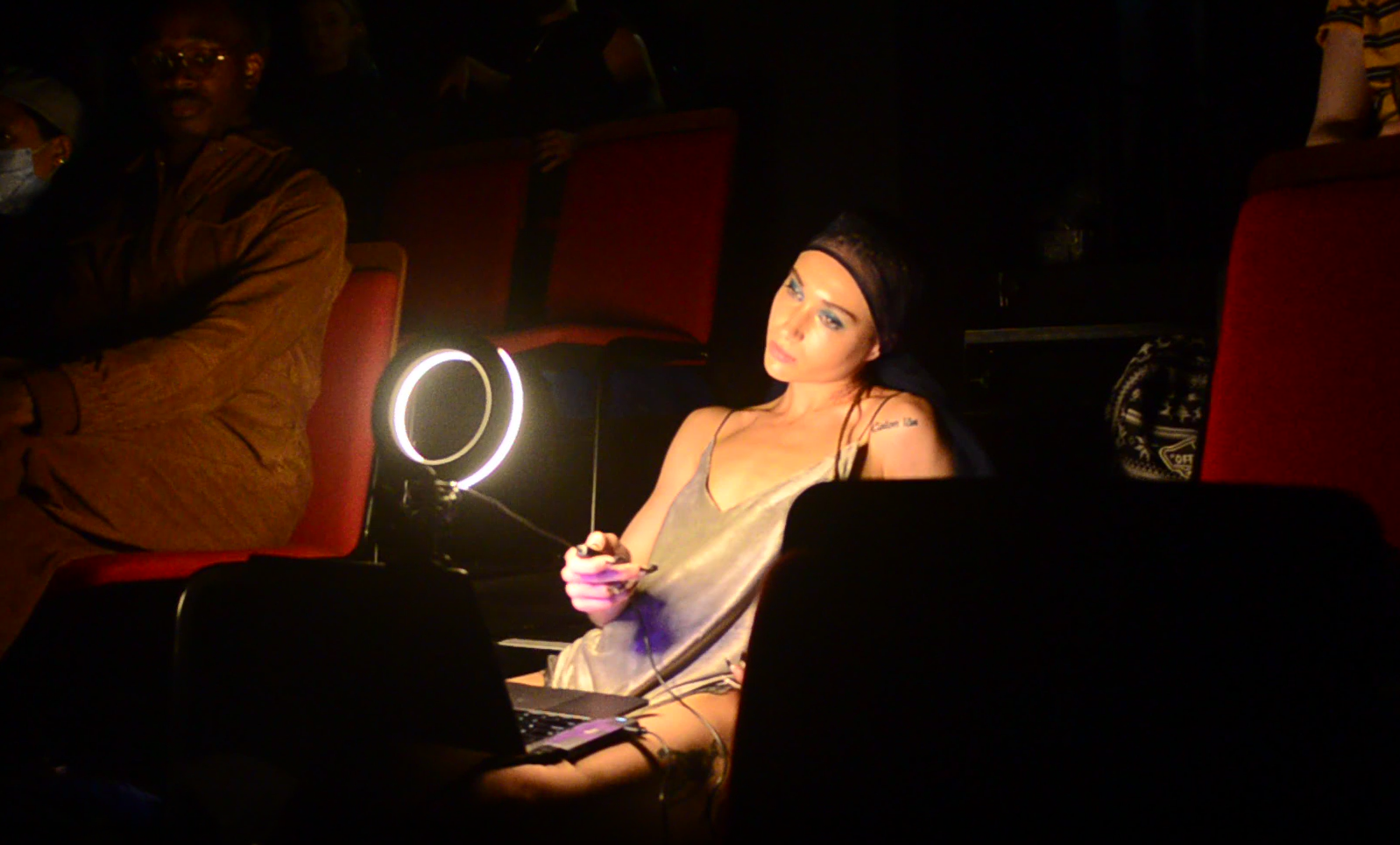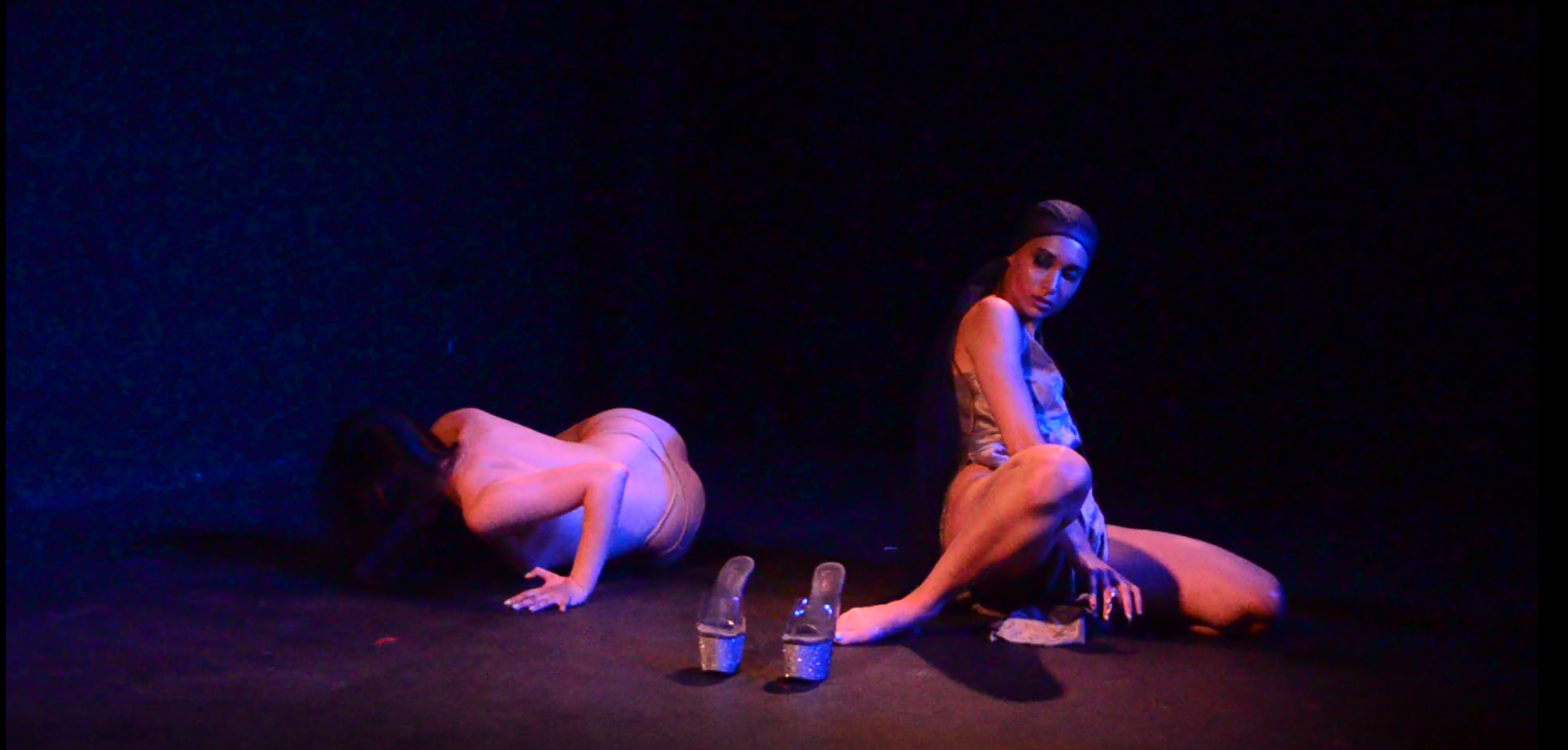Words by Francesca Matthys.
The work that Maya Williams and Lizzy Tan (Fimbo Butures) collectively journey through is more than just what meets the eye, the ear and flesh of those that experience it – it is an intricate negotiation of their stories. An “oozing out’ of life experiences that are held in both theirs and the bodies of those that have come before them.
The work For You: Wicked was offered as part of the Camden People’s Theatre’s event WIP It Real Good #1 an appropriate context that created space for intriguing artists and their works in progress. WIP It Real Good #1 encouraged interesting new work that had never been seen, offered a safe and open space for this delicate work to be shared.
For You: Wicked is a new compilation of movement research that traces the performers’ experiences as queer sex workers and dance artists and how these existences are perceived through multiple societal lenses. The work’s tapestry fuses power-play-meets-dress-up, high femme archetypes and most excitingly the use of live online forum engagement.
As we entered the theatre space, Lizzy Tan greeted us with their bare body, minimally clothed (a reference to Tan’s interest in nudity and semi-nudity and how bodies in these states are read), laid centre stage, vulnerable to onlookers yet concealed by their long dark hair. The self as protection. This evoked trepidation as to where we would journey as the audience, and incited curiosity about this unknown body subtly presented to us.
It was only a few minutes into ‘blackout’ that I had noticed my fellow audience members straining their heads backwards to observe another performer, Maya Williams, who too served us their flesh yet adorned it with a long teal net, almost bride-like, wearing platform stiletto high heels too. They confidently extended their body across the stairs inadvertently toying with us, and held a laptop and ring light on their lap.
With the emergence of social media, particularly Instagram and TikTok, ring lights have become extremely identifiable as a part of an arsenal kept to present oneself online in only the most flawless way. Illuminating the face, the eyes, that which we wish to share with the world. This piqued my interest as what was being exposed beyond the light of the device was in clear sight. It was as if we were being asked to look.

The audience welcomed witnesses as Williams gracefully began to connect their laptop to LiveJasmin, one of the oldest adult camming websites. As the cam site page projected onto the screen in front of us, we were no longer just an audience at a theatre. We were watchers, viewers, subscribers, patrons of art, of sex work, of a moment that felt very private. This opening immediately plummeted us into the creators’ experiences as queer sex workers and dance artists and how:
“these ways of moving and existing are observed through lenses of racialised and gendered perspectives of the performing body.”
The work continued its momentum as Williams began to speak through their experience of LiveJasmin, commenting on the presence of the viewers that were online and ready to receive them. We were privy to who they were, their online names and sometimes where they were from. This was probably one of the most compelling moments of the work that I hope to see develop, as it was all real and happening before our eyes. I felt myself yearning to know what Williams’ online viewers would say, how they would respond if they knew Williams was in a public space, if they knew that their activity was being watched. As the opening of the work it certainly teased the audience into the world in a very courageous way. However, we were spared from these answers. And though the tension in the theatre was palpable, it was clear that they had used this platform many times, which almost allowed for a slight sense of safety for those watching.
Williams quickly closed their laptop though and began to move onstage, leaving our minds wandering in the tabs and chat boxes of LiveJasmin. What if they had stayed on the site and shared with us a live chat with a desiring taker. What if it had gone wrong? What if it was successful and all parties felt satisfied and safe? Who would feel exposed? Us or Williams who clearly displayed control in their choices? This is the residue of that moment in time. With platforms like OnlyFans opening accessible and almost ambiguous spaces for sex work to exist, I am curious to know how an audience may respond to this real content within a theatre space where the proximity to it is only an arm’s length away.
It was here that I began to become aware of the rain like sound that filled the space. A rain or static like sound that is evocative of old school televisions and in contrast with the modernity of cyberspace. Sound tends to activate the imagination and either enhance or detract from a performance, and in this instance I felt quite a neutrality in the soundscape that allowed me to focus on the performer’s voice which felt more important at the time.
As the old television in my mind tries to move through channels, perhaps it is also representative of processing, of figuring and finding one’s way through this complex landscape of the work, for us and…them.
Williams, adorned with the teal veil, then approached the stage in a slithering like quality, beginning a monologue that contorted the sentence “Not safe to work” into variations such as “Not safe from work” that brought us further into the conditions of this work, this sex work, this art work, this human work and the overlaps thereof.
They went on to share the words “I am exactly where you think I am”. I found this poignant as we are brought into this pulsating world that naturally makes us consider the reality of the queer sex work experience and the vulnerability and precarity of this profession. Again for me reflecting on safety, accessibility and wellbeing. This moment in the performance is a reminder that we were still the watcher, the consumer and for some time shifted a level of responsibility for the performer onto the audience.
As I observed the two bodies, one in slow slithering motion across the stage, shouting their truths and the other trying to take up space though concealing identity and almost staying anonymous like a graffiti artist in the night, the levels of private and public were emphasised.
In our conversation after the event it was affirmed by Williams that the bodies were not separate at all, stating “…because I know our research, I know our story. I know Lizzy, we know each other so they don’t feel distinctive to me.” Tan contributed to this by sharing “Maya and I aren’t separate people. There is very much this…conscious, subconscious work. The work on the outside, the work on the inside that is very important which is why we have very separate movement languages and very distinct appearances.” There is a meta experience that is weaved through the close knit and sensitive relationship of the collective that is admirable. When asked how they collectively debrief throughout a process, Fimbo Butures (Tan and Williams’ collective) emphasised the need to prioritise time and care. Tan also shared that “We are conscious to not create the ‘Do this or else…’ structure…we set ourselves up to not do things that are going to be too extractive so that is how we do care before…”
From the followup conversation with the collective, it was evident that their movement and literary research hold not only a distinct political but also personal weight culminating into a distinct form to be shared. Through this post performance dialogue the collective made reference to the fetishisation of femme bodies in history, making reference to Saarjie Baartman. As a South African familiar to me as Saarjie Baartman, a Khoikhoi woman from Southern Africa who can be seen as the first African female trafficked and sexualised due to her appearance.
The fetishised gaze and scrutiny through which femme bodies are viewed are powerful motifs threaded throughout the work and unfortunately their everyday experiences that inform the work. Their work is definitely also a commentary on the representation of the many queer bodies of colour who wrestle with the perception of their bodies in work [art and sex].
In our conversation the collective also shared the occurrences of the evening before the performance where Maya’s LiveJasmin account was blocked for arbitrary reasons. This certainly became an eerie representation of how these bodies in questions and their choices are policed.
For You:Wicked is a delicate exploration that offers potential to really affect an audience on a cellular level. As the work is in progress, it would be interesting to see how the collective begins to develop their work to clearly guide the audience on the visceral journey that they initially invite us on. I look forward to seeing how the relationship between the two bodies develops and whether that tension of no physical touch.
Fimbo Butures has shared that they plan to create a film version of the performance, I look forward to the many iterations that may unfold in this rich terrain.
For You: Wicked was performed on the 30th May 2022 at the Camden People’s Theatre
